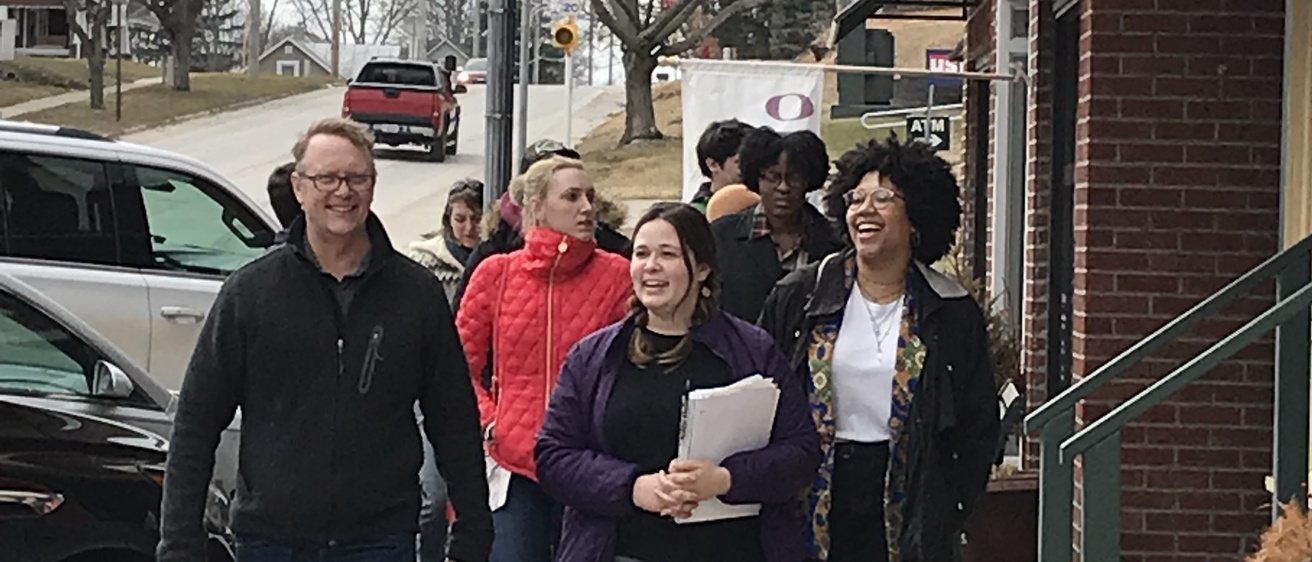The Graduate Engagement Corps (GEC) is an opportunity for students seeking advanced degrees to learn about and receive support for community-engaged teaching, learning, and research. Members of the GEC will also be part of a network of like-minded, community-engaged students that can provide friendship and connection throughout their time at the University of Iowa.
"This is a community of students looking for the opportunity to make an impact in the world through research and teaching," said Nick Benson, executive director of the Office of Community Engagement." The GEC will give you training, resources, and a community to join to advance those causes."
The GEC was born out of the sunset of the Obermann Center's Graduate Institute on Engagement and the Academy. Benson and Obermann Center leadership worked over the summer to transition the program and make it more accessible and practical for participants.
The GEC will offer graduate and professional students training, support, and financial resources to help impact their communities through engagement. The orientation and workshops will provide the training, the GEC network will provide support, and grants launching fall of 2022 will provide the financial resources through grants for which GEC members can apply.
"The wonderful thing about the GEC is that it is accessible for everybody, and it is a reasonably brief time commitment," Benson said. "There is an orientation in the middle of January for three short half days where you will get the opportunity to learn about engaged research and teaching while making connections with community partners."
The GEC network will provide connections, resume-building training, and experiences for graduate students looking to enhance their professional skills. For those looking to improve their research skills, the second day of the orientation will focus on community-engaged research principles. The third day will be devoted to developing community partnerships and working with University of Iowa partners already connected to graduate and professional students.
"One of the things that we will be talking about during the orientation is working with community partners grounded in the work that you are interested in doing," Benson said. "Community partnerships are born out of your interests, so whatever research topics you are interested in as a graduate student, we will discuss how you connect to community partners with that."
Following orientation, opportunities to participate in individualized workshops on specific topics within community engagement that are most interesting and relevant to graduate students' work will be available to create partnerships that will exist past graduation.
"There will also be opportunities to informally get together with other members of the GEC to talk about the progress you are making with your research or teaching, ask questions, or potentially collaborate with other graduate students on your work," Benson said. "One of the best things about being a part of the corps is that you will connect with other types of graduate students to learn about ways your work can intersect with what they are doing."
Graduate students who care a lot about their research and building a research portfolio will get a jump start on that process with ready-made research ideas, opportunities to connect with other researchers, and the ability to amplify the work they want to do.
"After that, it's as much of a connection as you want with your community. It's about taking part in a couple of workshops, and the best thing is that at the end of the process, you will be able to apply for grant funding," Benson said. "One of the most challenging aspects of getting a research portfolio off the ground is funding, and the GEC will give you opportunities for pilot funding to start that process."
The GEC program is open to any graduate or professional student and is limited to 25 people on a first-come, first-serve basis.
"We encourage all graduate students who care about community, engagement, and making a difference in the world with research and teaching to apply for this," Benson said.
The GEC program aims to grow to accommodate more students, provide robust and unique training, and make more funding available for participants while serving as a blueprint for higher education institutions across the country.
Story by James Dykeman
More information is available here.
